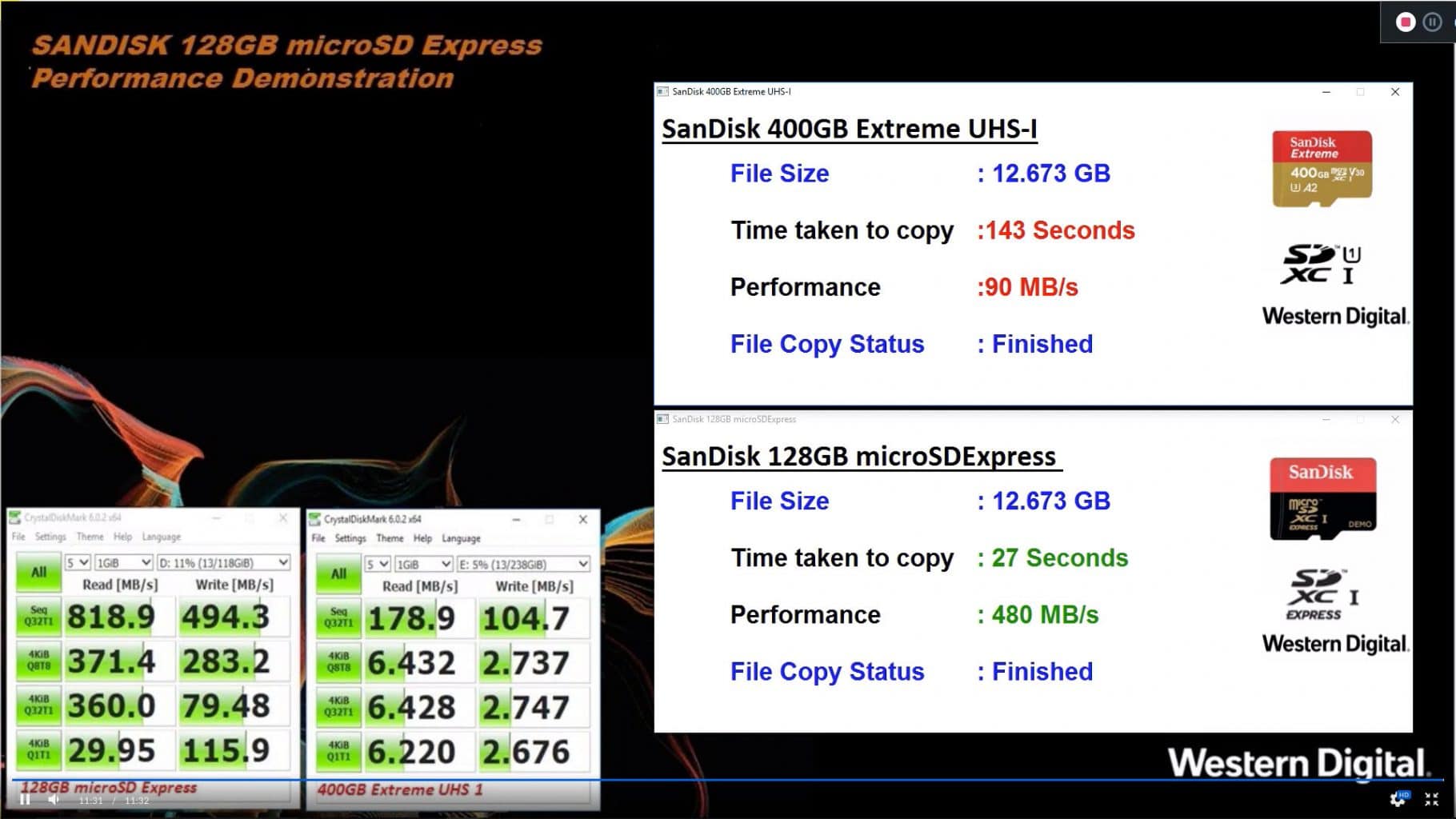Raising the Tide – First Demo of microSD™ Express
“A rising tide lifts all boats” succinctly describes the latest innovative standard for microSD cards released by the SD Association (SDA), namely, microSD Express. MicroSD Express will propel the future of our data-hungry world to a new high that has never been seen before.
If you haven’t closely followed the news at Mobile World Congress for the last two years, the SDA has been busy creating new standards. These include SD Express for full-size SD cards and now for microSD cards both with the PCIe® and NVMe™ interfaces. This innovative standard is taking a huge leap forward by giving the popular form factors exceptional performance with faster access to data files.
To understand the benefits of these interfaces requires some technical understanding of the evolution of storage from SAS and SATA to NVMe. You can watch this short video, or read our technical guide to What is NVMe to learn more.
NVMe and PCIe interfaces are commonly used in extremely fast, modern SSDs to reach speeds of up to 1 gigabytes per second per lane.[1] These are two interface standards backed by continued research, development and long-term roadmaps that promise to revolutionize how we handle data. Now the SDA brings these capabilities to the small form factor of microSD, and we set out to demonstrate what it can do in a real-world scenario.
First Demo of microSD Express
We’ve been following the development in SD Express, and microSD Express very closely. Western Digital’s Yosi Pinto is the Chairman of the Board of the SD Association and we are a founder and longtime supporting member of the association with a fervent commitment to R&D.
Just a couple weeks ago in the framework of Computex and Compuforum in Taipei, we partnered with JMicron to show a real-world demo of the power of microSD Express. There were two demos on display: one was a SanDisk® microSD Express card in a PC showing the live performance of a movie file being transferred to the host; the other was a SanDisk microSD Express card running on a JMicron® USB 3.2 Gen2 microSD Express Card Reader performing the same task. Both the card and the reader were designed to meet the new SD7.1 specification so that it can potentially deliver up to 985MB/s data transfer speed.[2]
But how did it perform in a real-world workload?
Here’s a video of the actual demo:
As you can see in the demo, one of SanDisk’s fastest microSD cards, our SanDisk Extreme® 400GB UHS-I microSD card, delivered 178 MB/s read and 104 MB/s write speeds[3]. The microSD Express Demo card was able to deliver over 800 MB/s read and almost 500 MB/s write speeds. This is almost a whopping 4.5x to 5x improvement!
What This Means for Data
Faster speeds are essential for high-performance content, and this includes data-hungry applications running on cards in more and more mobile computing devices. The microSD Express capabilities are what will pave the way for the next generation of high-performance mobile computing requirements. This includes speed-demanding future applications in VR, AR and gaming systems, multi-channel IoT and automotive devices, 8K video capture and playback, and 360-degree video, to name a few.
One of the examples you could see in the demo is copying a 13GB file. The SanDisk Extreme microSD card required almost two and a half minutes to do so. Our microSD Express Card could copy this in just 26 seconds.
Many attendees in Taipei didn’t expect the real-world demo to deliver Sequential Read over 800 MB/s, and it sparked off many ideas for future use cases – from expandable PC storage for internal memory to surveillance camera data analysis at high speed. There is really no limit to human’s imagination once you unleash the creativity!
A Tide of Opportunities with microSD Express
With more devices and endpoints becoming intelligent and connected, the data we consume and produce will become bigger, richer, and more interconnected. MicroSD Express, supported by NVMe and PCIe, is opening a whole new world of data opportunities for mobile devices. We’re excited to help bring these possibilities to users and the ecosystem alike, and to raise the tide of the next evolution of mobile computing capabilities and experiences.
Learn More
- Learn about our partnership with JMicron
- Contact OEMProducts@WDC.com for more information
- [1] PCI Express 3.0 – FAQ
- [2] SD Express and microSD Express Cards: The Best Choice for Your Future Product Designs
- [3] Demo results only; engineered with proprietary technology to reach speeds beyond UHS-I 104MB/s. Actual speeds may be lower depending upon host device interface, usage conditions and other factors. 1MB=1,000,000 bytes.





